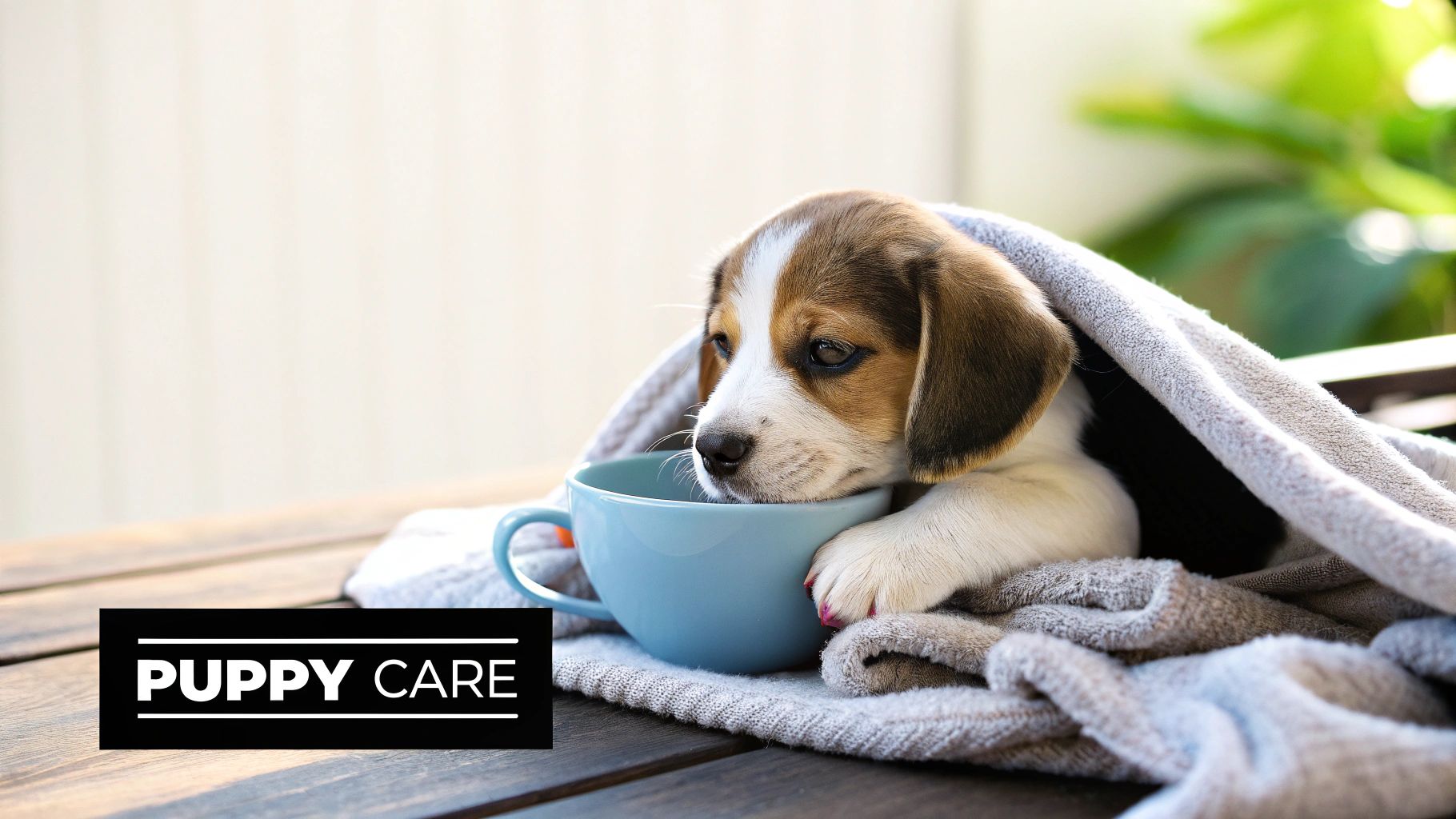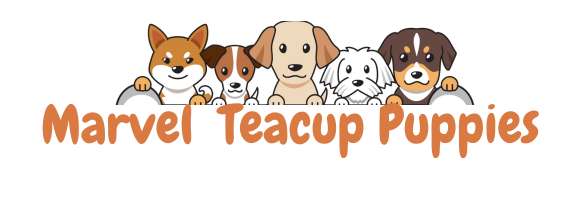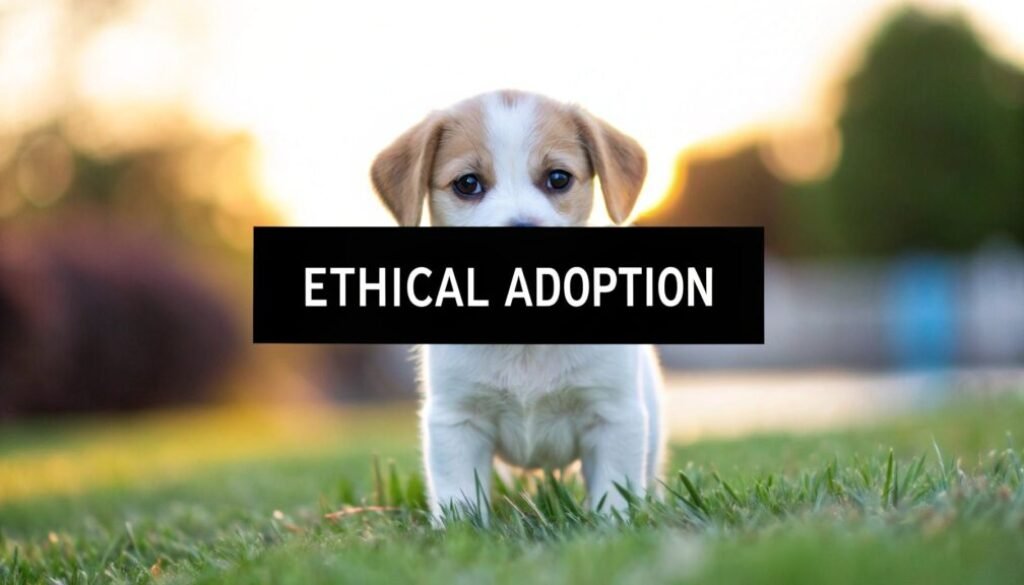Teacup Puppy Adoption: Expert Guide to Ethical Choices
The Truth Behind 'Teacup Puppies': Myths vs. Reality

The term "teacup puppy" often brings to mind a tiny, charming dog small enough to fit in the palm of your hand. But this popular term often masks the realities of these petite pups. It's essential for potential adopters to understand the significant differences between a legitimate toy breed and a dog bred to be unusually small. You might be interested in: Our Sitemap for more related articles
Understanding Breed Classifications
While the term "teacup puppy" is common, it isn't an official breed classification. Real toy breeds, such as Chihuahuas or Yorkshire Terriers, are standardized by kennel clubs like the American Kennel Club (AKC) and have established size ranges. The label "teacup," however, is generally a marketing strategy used to describe dogs bred to be smaller than the breed standard.
This frequently involves breeding the runts of litters, a practice that can unfortunately lead to health issues. In 2023, an estimated 3.2 million dogs entered U.S. shelters. A portion of those dogs were small breeds, including those marketed as "teacups." For further statistics, visit: https://www.shelteranimalscount.org/stats/
The Risks of Extreme Miniaturization
Breeding for extremely small sizes can significantly impact the health of these "teacup" puppies. These dogs are often more susceptible to hypoglycemia (low blood sugar), have fragile bones, and are prone to dental issues.
Their lifespan can also be shorter than standard-sized dogs, and they may require special veterinary care. This raises important ethical questions regarding breeding practices that prioritize appearance over a dog's health and well-being.
Ethical Breeding vs. Marketing Ploys
Ethical breeders place the utmost importance on the health and temperament of their dogs. They strictly adhere to breed standards and avoid practices that jeopardize the well-being of the animals. Sadly, some breeders capitalize on the demand for "teacup puppies" through unethical means.
This frequently results in puppies with significant health problems and behavioral difficulties. For this reason, potential adopters must carefully choose a responsible breeder who prioritizes the animal's welfare.
Focusing on Health and Well-being
Ultimately, adopting a puppy should be centered on finding a healthy, happy companion. Rather than focusing on the appeal of the "teacup" label, prospective owners should prioritize the dog's overall health and well-being.
This includes thoroughly researching reputable breeders who focus on ethical practices. Consider adopting from shelters or rescues where many healthy small-breed dogs are waiting for loving homes. By making responsible choices, adopters can discourage unethical breeding practices and ensure a positive experience for both themselves and their new furry friend.
Ethical Teacup Puppy Adoption: Choosing Compassion Over Cuteness

The undeniable allure of a tiny "teacup" puppy can lead many well-intentioned individuals to unintentionally support a troubling industry: puppy mills. Driven by profit, these large-scale breeding facilities often disregard animal welfare, subjecting dogs to inhumane conditions. But what if you dream of sharing your life with a small breed? Thankfully, there's an ethical alternative: teacup puppy adoption.
The Ripple Effect of Adoption
Adopting a teacup puppy from a shelter or rescue is a deeply impactful decision that goes far beyond simply gaining a pet. When you adopt, you immediately free up valuable shelter space and resources, allowing them to help another animal in need. This means your single act of kindness can potentially save multiple lives.
Furthermore, choosing adoption helps dismantle the demand that keeps unethical breeding practices alive. By reducing the support for puppy mills, you contribute to a larger positive change within the animal welfare community. It's a ripple effect of compassion that starts with one adoption.
Debunking Shelter Dog Myths
Misconceptions about shelter dogs, especially concerning their health and temperament, often deter potential adopters. The truth is, shelters employ rigorous evaluation processes to understand each dog's individual needs and personality. Many shelters also collaborate with local veterinarians, like those found through the American Veterinary Medical Association, ensuring dogs receive comprehensive medical care. This includes essential vaccinations and spay/neuter procedures. So, when you adopt, you can rest assured you're welcoming a healthy, well-cared-for companion into your home.
The persistent demand for small dogs, sometimes deceptively labeled as 'teacup' breeds, sadly contributes to the problem of puppy mills and irresponsible breeding. According to the Humane Society, nearly 10,000 puppy mills operate in the U.S., with many prioritizing profit over animal welfare. Learn more about these statistics.
To help illustrate the key differences between adoption and purchasing from less ethical sources, let's examine a comparison:
Adoption vs. Purchase Comparison
| Factor | Shelter Adoption | Breeder/Store Purchase |
|---|---|---|
| Cost | Lower adoption fees | Significantly higher prices |
| Health | Often fully vetted; history may be unknown | Health background can be uncertain, particularly from puppy mills |
| Impact | Supports shelters and reduces demand for puppy mills | May inadvertently support unethical breeding |
| Availability | May require more searching for specific breeds | Often readily available, but ethical concerns may exist |
| Emotional Bond | Offers a second chance at life, creating a unique bond | Standard pet acquisition |
This table highlights the significant advantages of adoption, especially the ethical implications and the potential to save a life. While finding the perfect teacup breed might take slightly more effort, the rewards are immeasurable.
Finding Your Perfect Tiny Companion
Finding a smaller dog for adoption might require a slightly different approach. Seek out specialized rescue organizations that focus specifically on small breeds. These dedicated groups provide tailored care and understand the unique needs of these petite companions, making them an invaluable resource in your search.
The Joy of Adoption
Adopting a teacup puppy isn't merely about acquiring a pet; it's about offering a deserving animal a loving forever home. The bond formed through adoption is incredibly special, founded on mutual respect and gratitude. Countless families who have adopted small dogs from shelters share heartwarming stories of their companions' resilience and unwavering affection. This underscores the transformative power of rescue, enriching the lives of both the animal and the adopting family. It's a testament to the profound rewards of choosing compassion over cuteness.
Finding Your Tiny Companion: Small Breed Adoption Strategies

Adopting a pet is a wonderful experience, and finding a small breed puppy requires a focused approach. It’s about knowing where to search, presenting yourself as a responsible adopter, and connecting with the rescue community.
Specialized Rescue Networks: Your First Stop
Begin your search by contacting rescues that specialize in small breeds. These organizations often work with a network of foster homes experienced in caring for tiny dogs. Fosters can offer important details about each dog's personality and individual needs. Many specialized rescues also collaborate with shelters, which expands your search possibilities.
Optimizing Your Adoption Application
A strong application is key to a successful adoption. Be honest and provide complete information. Share any experience you have with small dogs and demonstrate your commitment to providing a secure and loving home. A thoughtful application shows you are serious about adopting.
Timing and Availability in Shelters
The number of small breeds at shelters changes constantly. Puppies, and especially small ones, tend to get adopted quickly. Checking shelter websites often, and even visiting in person, can improve your chances. Being open to different small breeds may also lead you to a perfect companion.
Online Platforms and Foster-Based Rescues
Many online platforms connect adopters with dogs needing homes, including small breed puppies. These platforms often allow you to filter by breed and size. Petfinder is a good example of a platform that helps connect prospective pet owners with animals in need. Foster-based rescues provide a unique opportunity to learn about a dog's behavior and personality in a home setting. This is especially valuable when seeking a puppy that fits your lifestyle.
Effective Communication and Red Flags
Communicating openly with shelters and rescue organizations is essential. Asking detailed questions shows your genuine interest and allows you to gather important information about the puppy you're considering. Be mindful of red flags, like vague descriptions or an unwillingness to answer questions about a dog’s background.
Building Relationships Within the Rescue Community
Building connections with local rescues can be invaluable in your adoption journey. Volunteering or donating not only supports these organizations but also introduces you to staff and foster families. This can give you access to dogs before they are even publicly listed. Actively participating in the rescue community shows your dedication and could lead you to your perfect tiny companion.
The Real Investment: Understanding Teacup Puppy Adoption Costs

Bringing a teacup puppy into your life is a joyous occasion. However, it's essential to understand the financial commitment before you welcome your new furry friend. Planning for their lifetime needs involves more than just the initial adoption fee. It requires careful budgeting and consideration of long-term expenses associated with their specialized care. You might be interested in: Our Sitemap for more articles about teacup puppies.
Initial Adoption vs. Breeder Costs
One of the first financial decisions you'll face is the initial cost of acquiring your puppy. Adoption fees typically range from $50 to $300. This is considerably less than purchasing a purebred from a reputable breeder. Prices from breeders, or worse, unethical puppy mills, can easily exceed $1,000. Discover more insights about adoption costs. Remember, responsible adoption involves much more than just the initial fee.
Veterinary Care: A Special Consideration for Small Breeds
Small breeds, particularly those marketed as "teacup puppies," often have unique veterinary needs. Due to their diminutive size, they are more susceptible to certain health issues, leading to potentially higher vet bills. Hypoglycemia, or low blood sugar, is a common concern in teacup puppies, often requiring immediate veterinary attention. They are also prone to dental problems and have delicate bones, necessitating ongoing care and potentially costly surgical interventions.
Preventative Care: Saving Money in the Long Run
Investing in preventative care can significantly reduce long-term veterinary costs. Regular check-ups, vaccinations, and dental cleanings are vital for maintaining your small dog's health. This proactive approach can prevent minor health concerns from developing into major, and more expensive, medical problems.
Budgeting for Nutritional and Environmental Needs
Don't forget to factor in the unique nutritional and environmental needs of teacup puppies. High-quality, breed-specific food is crucial for their overall health and well-being. Additionally, their small size often necessitates specific bedding, clothing, and even temperature-controlled environments due to their sensitivity to temperature fluctuations.
Pet Insurance: Weighing the Benefits
Consider pet insurance as part of your budgeting plan. While it adds a monthly expense, pet insurance can provide valuable financial protection if your puppy experiences unexpected illnesses or injuries. This is particularly relevant for teacup puppies, who may be predisposed to certain health conditions. Pet insurance can offer peace of mind and potentially save you considerable money on large vet bills.
To help you understand the lifetime costs associated with a small breed dog, we've compiled a detailed breakdown:
Lifetime Cost Breakdown for Small Breed Dogs
| Expense Category | First Year Costs | Annual Costs | Lifetime Estimate |
|---|---|---|---|
| Adoption Fees | $50-$300 | – | $50-$300 |
| Food | $300-$600 | $300-$600 | $3,300-$6,600 (based on a 11-year lifespan) |
| Vet Care (Routine) | $200-$400 | $150-$300 | $1,850-$3,700 (based on a 11-year lifespan) |
| Vet Care (Unexpected) | $0-$1,000+ | $0-$500+ | Varies greatly |
| Toys/Treats/Supplies | $100-$200 | $50-$100 | $650-$1,200 (based on a 11-year lifespan) |
| Grooming | $100-$300 | $100-$300 | $1,200-$3,600 (based on a 11-year lifespan) |
| Total (estimated range) | $750-$2,600+ | $600-$1,800+ | $7,250-$18,900+ |
This table provides a general estimate. Actual costs may vary depending on your dog's specific needs and your location. It's important to remember that unexpected vet bills can significantly impact the overall lifetime cost.
Smart Strategies for Managing Expenses
Managing expenses doesn't mean sacrificing your puppy's care. There are several ways to budget effectively. Consider joining a local dog-walking group to share the cost of professional walkers. Making homemade treats and toys can be a fun, cost-effective activity you can enjoy with your pet. With careful planning and informed choices, you can provide your teacup puppy with the best possible care while managing your finances responsibly.
Caring for Fragile Friends: Small Dog Health Essentials
Small dogs, especially those sometimes referred to as "teacup puppies," have unique health needs. Understanding these needs is crucial for any prospective owner. This means being prepared for potential health concerns and providing specialized care.
Hypoglycemia: A Serious Concern
Hypoglycemia, or low blood sugar, is common in small breed puppies. Their small bodies can struggle to regulate blood sugar, especially between meals. Recognizing the warning signs is crucial. These signs can include lethargy, weakness, and tremors. If your puppy seems unusually tired or shaky, check their blood sugar and seek veterinary attention if needed.
Dental Care: Essential for Longevity
Dental health significantly impacts a small dog's overall health and lifespan. Their small mouths are prone to crowding and plaque buildup, leading to periodontal disease. Regular brushing, dental chews, and professional cleanings are vital. Appropriate chew toys can also help stimulate their gums and keep their teeth clean.
Skeletal Issues: Prevention and Management
Small breeds are susceptible to certain skeletal problems, such as patellar luxation (a dislocated kneecap). Provide a safe environment, avoid high jumps, and support their joints with appropriate bedding to minimize risk. Just as a delicate teacup needs careful handling, so does a teacup puppy's skeletal structure. Learn more in this article about product details.
Diet and Exercise: Tailored to Tiny Metabolisms
A balanced diet formulated for small breeds is essential. These dogs have fast metabolisms and need frequent meals to maintain stable blood sugar. Their exercise needs differ from larger breeds. Short, frequent walks and playtime are better than strenuous exercise, which can strain their small frames.
Temperature Regulation: Keeping Them Comfortable
Small dogs, especially those with short coats, can struggle to regulate body temperature. They're prone to both overheating and getting too cold. Provide appropriate clothing in cold weather and ensure access to shade and cool water when it's hot.
Pre-Adoption Health Screening: Asking the Right Questions
When considering teacup puppy adoption, thoroughly screen potential adoptees. Ask about their health history, including genetic conditions or previous illnesses. This helps you make informed decisions and prepare for potential challenges. A comprehensive health screening is vital. For instance, a puppy mill might overlook health indicators.
Creating a Safe Haven: Preparing Your Home for Tiny Paws
Bringing a teacup puppy into your home is an exciting event. However, ensuring a safe environment for such a delicate creature is paramount. For a dog weighing under five pounds, everyday items can be surprisingly dangerous. This section offers valuable advice on preparing your home for a teacup puppy.
Identifying Potential Hazards
Common household items can pose significant risks to small dogs. It's similar to baby-proofing, but with a furry friend in mind. Electrical cords should be secured and out of reach. Dangling blind strings need to be tied up or shortened. Toxic cleaning products must be stored safely, completely inaccessible to your puppy. Even seemingly harmless items like loose change or small children’s toys can be choking hazards.
Creating Safe Zones
Due to their size, teacup puppies can easily feel overwhelmed by household activity. Designating specific safe zones allows your puppy to retreat for some quiet time. This could be a crate, a cozy dog bed tucked away in a quiet corner, or a small, gated-off area. These spaces provide a sense of security and help your puppy acclimate to their new home.
Furniture Arrangements and Jumping Injuries
Small breeds are susceptible to jumping injuries because of their delicate bone structure. Thoughtful furniture arrangement can prevent dangerous leaps. For instance, place ottomans or small steps next to higher surfaces like sofas or beds. This allows your puppy to navigate safely. Discourage them from jumping on and off high furniture.
Specialized Equipment for Small Breeds
Certain products are designed specifically for teacup puppies. Small breed harnesses are generally safer and more comfortable than traditional collars, especially for dogs prone to tracheal collapse. Harnesses distribute pressure more evenly. Also, consider stairs or ramps for easy access to furniture. These are like tiny accessibility tools for your puppy, preventing injuries and making their lives easier.
Temperature Management for Tiny Dogs
Teacup puppies are particularly sensitive to temperature fluctuations. They can quickly become chilled or overheated. Maintain a comfortable room temperature and provide soft bedding for warmth. During colder months, a dog sweater offers extra insulation. In the summer, ensure access to shade and plenty of fresh water.
Introducing Other Pets Safely
If you have other pets, introductions should be gradual and supervised. Keep the puppy separated in its safe zone initially. This allows the animals to acclimate to each other's scents. Then, introduce short, supervised interactions, gradually increasing the time they spend together. This minimizes stress and fosters a positive relationship.
Room-by-Room Checklists
Develop room-by-room checklists to ensure every space is puppy-proof. This systematic approach helps identify and mitigate potential hazards. Check for anything a curious puppy might chew on or swallow, secure loose wires, and double-check that all cleaning supplies are safely stored away.
Specialized Housing Recommendations
Different housing types present unique challenges. If you live in an apartment, secure balconies and ensure windows are properly screened. In homes with stairs, use baby gates to restrict access and prevent falls. Adapting your safety measures to your specific living situation is crucial.
Ready to welcome a teacup puppy into your loving home? Explore the adorable teacup puppies at Marvel Teacup Puppies and find the perfect companion for you.
Article created using Outrank




